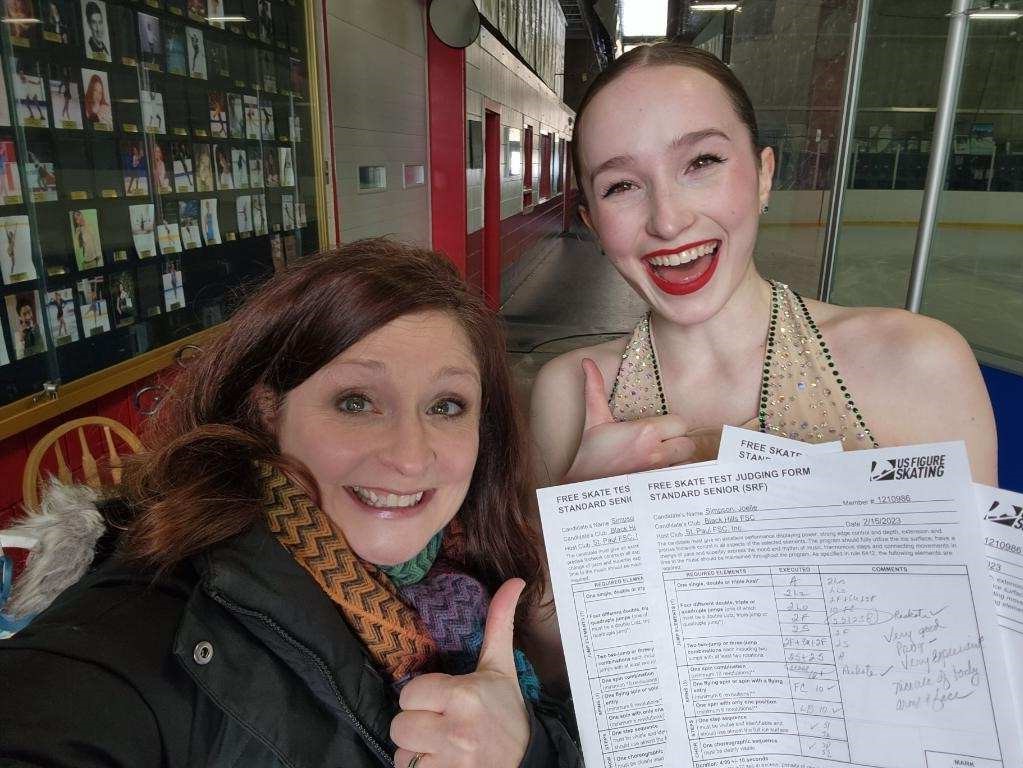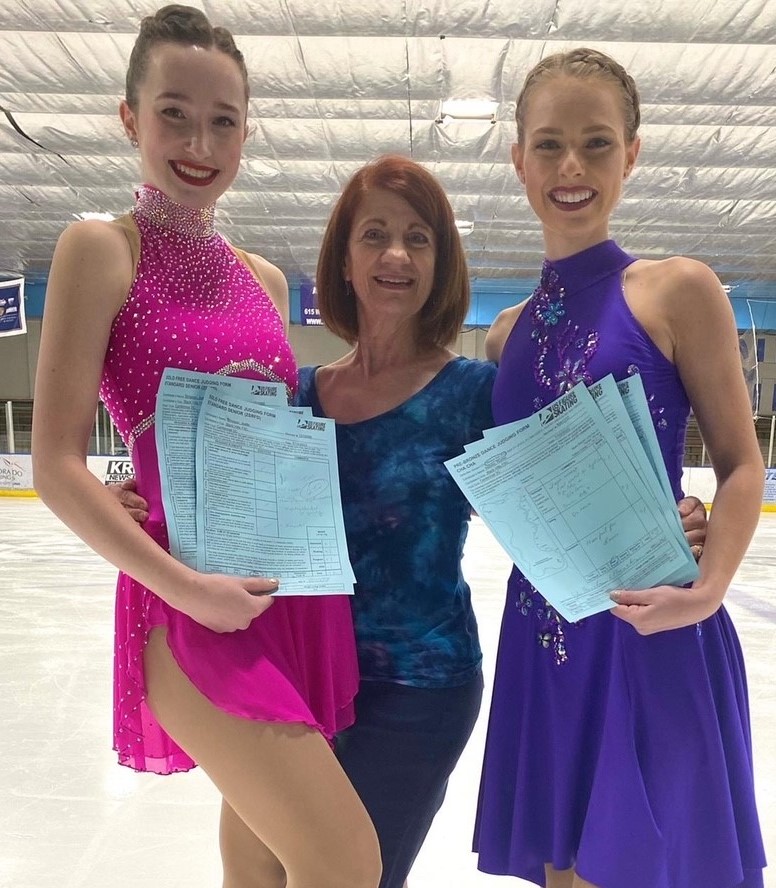By Mimi McKinnis
When she was a little girl, Joelle Simpson skated beneath a handful of banners hanging at Roosevelt Park Ice Arena, each featuring the names of local South Dakota skaters who had earned a U.S. Figure Skating gold test medal. Now, when she returns to her home rink in Rapid City during breaks from her undergraduate studies at the University of Minnesota, she skates under a new banner with a familiar name: Her own.
“Seeing it up there made me reflect back to what I wanted and what I looked up to when I was a little girl,” Simpson said. “I remember seeing the banners from other gold medalists who came before me. I’d always see them as I was practicing and training and I would think, ‘Maybe one day my name is going to be up there.’ I feel extremely proud to see my name up there now.”

Simpson not only attained the highest level of testing proficiency in one track, but in four, making her the state’s first quadruple gold test medalist—an achievement she never thought possible in her younger days, especially when a move to rinkless Spearfish, South Dakota, kept her off the ice for nearly six years.
“When we moved back to Rapid, I didn’t know the test track was a goal within reach,” Simpson said. “There had only been three other girls from my club who had tested and tried to earn gold medals, and in order for them to achieve it, they had to go to Colorado to train. It was something I had looked up to, but there just weren’t resources in my area. I didn’t think that high a level was reachable for me.”
Along with skating, Simpson was working toward a diploma from Stevens High School, singing in the school’s choir, playing the harp both at weddings and with the local symphony and training in several disciplines of dance like ballet, jazz and pointe, effectively taking out-of-state training off the table. But when Debbie Minter, a master-rated coach with 40 years of coaching experience and five U.S. champions to her credit relocated from Denver to the Black Hills area, a new level of instruction opened up higher levels of opportunity.
“It was the first time we all had the opportunity to work with a high-ranking coach,” Simpson recalled. “I really took advantage of that. Her daughter was also my coach, and she told me I could be a double gold medalist. She said ‘This is something you can do. You can achieve this.’ At that point in my skating career, I wasn’t really that confident in myself, so hearing that was shocking to me. Hearing that from somebody that I looked up to was extremely influential. It really helped boost my confidence and motivated me to see what I was capable of.”
Starting high school with her new coaches and newfound confidence in tow, Simpson began working toward her goal of being a double gold medalist just in time for COVID-19 to derail her plans during her sophomore year. But with years of dance training to her name, Simpson was able to maintain both athleticism and artistry off the ice, allowing her to pick right back up when her home rink reopened in September 2020. That same training also made ice dance a natural fit to expand her original goal.

“At first my goal was to be a double gold medalist, but then I started ice dancing,” Simpson said. “I realized that there might be more to my goal because I started testing in more and more disciplines. I saw people working on solo free dances, and I thought, ‘I think I could do that, too.’ So I decided hey, might as well go for four!”
After a call to U.S. Figure Skating confirmed the only other skater in Black Hills to have four gold test medals was none other than coach Minter, who was not a native of the state, a new goal was born—and achieved with impressive speed. Within a year of passing her senior skating skills, Simpson added gold medals for solo free dance, free skate and solo pattern dance to her resume.
“That was crazy to me, and definitely motivating,” Simpson said. “I don’t think there was anyone else trying to get four within the state at the time, but I definitely thought it would be cool to be the first, and to help other skaters from South Dakota know that it’s possible, especially with the help of virtual testing.”
And while the pandemic delayed her finish line through her freshman year of college, a timeline she “wouldn’t have wanted any other way,” it was also COVID that made way for remote opportunities like virtual testing—an option that allowed Simpson to film and submit her final senior test from her home rink in Rapid City, and one she hopes will continue to open doors for young skaters like she was, in areas with limited on-ice resources.
“One of the most important things skating has taught me is that I can do anything that I put my mind to,” Simpson said. “It’s taught me the power of hard work and perseverance, and to never give up. A seemingly impossible goal, I made a reality, and that’s something that I’ll apply to the rest of my life. I have some big academic goals that seem scary at times, but I can remind myself that anything is possible.”
Now, with her name hanging as a fixture among the role models she aspired to be as a beginning skater, Simpson wants the next generation to believe in themselves the way her coaches believed in her.
“I’ve made it a priority to tell the younger skaters at my rink now, ‘You can become gold medalists. You can reach your goals in figure skating, whatever they are, even if it seems really hard and daunting,’” Simpson said. “When I was little, I didn’t think I could do it. I didn’t think I had the resources, and I didn’t think I was good enough. But it is possible. That’s something I want everyone to know. The moment someone believed in my abilities and told me I could make it happen was such a pivotal moment for me. If I could share that with other skaters out there who might be thinking they can’t do it, I want them to know they can do anything they put their mind to.”


